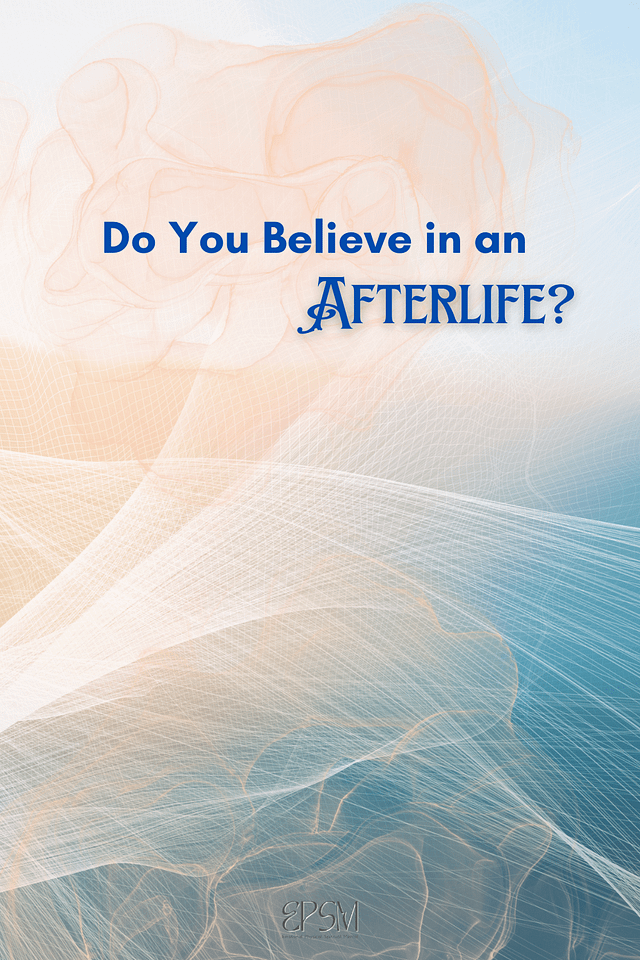Do you Believe in an Afterlife?

We are coming into spooky season and one of the main topics (directly or indirectly) that we explore this time of year is the idea of the Afterlife. Throughout the course of human history, the concept of an afterlife has been deeply ingrained in various philosophical and spiritual traditions. Beliefs surrounding the afterlife offer comfort, provide answers to existential questions, and shape our understanding of what lies beyond our mortal existence. I think we battle with this idea on a deep level nearly everyday of our lives. Death and what happens to us after is an undertone in many things.
Even when it isn’t the season, I love a good afterlife chat. My childhood was a mix of classic Christian beliefs paired with an understanding that we share this world with other entities that either existed here or were able to cross over from their own plane of existence. It was interesting and somewhat terrifying. I was certain that there was more going on than what we could see in our daily lives. Now, as an adult, I know that there are many belief systems that have their own ideas; some are very similar and some are different. I find them all fascinating and comforting in the undeniable similarities In case you are interested, here’s a brief description of afterlife beliefs from around the world.
Ancient Mesopotamia and Egypt:
In Ancient Mesopotamian cultures, such as the Sumerians and Babylonians, the afterlife was believed to be an underworld, a shadowy realm where souls wandered. On the other hand, ancient Egyptians held a strong faith in the afterlife, believing in a complex journey involving the weighing of the heart against a feather. Those deemed worthy would attain immortality, while others would face eternal punishment or nonexistence.
Ancient Greece and Roman Traditions:
The ancient Greeks conceptualized the afterlife as Hades, a realm ruled by the god of the same name. Greek mythology offered a diverse range of afterlife destinations, including Elysium for the virtuous and Tartarus for the wicked. Similarly, Roman beliefs incorporated various notions from Greek mythology, emphasizing the continuation of an individual’s identity and existence in the underworld.
Eastern Philosophies: Hinduism, Buddhism, and Taoism:
Hinduism posits a cycle of birth, death, and rebirth, known as samsara. The ultimate goal is to break free from this cycle through spiritual enlightenment, achieving moksha, a state of liberation. Meanwhile, Buddhism teaches the concept of reincarnation, where actions in one life influence the circumstances of the next. The ultimate aim is to attain Nirvana, a state of transcendence beyond suffering. Taoism, originating in ancient China, alludes to an afterlife closely tied to the natural order, emphasizing harmony with the Dao in both life and death.
Abrahamic Religions: Judaism, Christianity, and Islam:
Abrahamic traditions share the belief in a judgment day and an afterlife replete with rewards and punishments. Judaism speaks of Sheol, a realm where souls rest until the final judgment. Christianity follows with the concept of heaven, hell, and purgatory, where suitable actions determine one’s eternal destination. Islam depicts a similar view, presenting Jannah (paradise) and Jahannam (hell) as realms awaiting individuals based on their deeds.
Modern Philosophical Perspectives: Existentialism and Agnosticism:
In more recent times, existentialist philosophers such as Jean-Paul Sartre and Martin Heidegger questioned the existence of an afterlife. Emphasizing individual agency, existentialism focuses on the significance of human existence in the present rather than speculating about an unknown future. Agnosticism, while not denying the possibility of an afterlife, asserts that the nature of such existence is unknowable based on human knowledge and limitations.
I hate to even question the idea that there isn’t something that happens after we die. How horrible is it to think of just “ending?” There is too much evidence that there is something going on that it just doesn’t seem possible. What are your thoughts on the afterlife? Do you believe in something happening after death or do you believe that we finish our lives here? I’d love to discuss!
I totally geek out on this stuff! And let me tell you, despite my attempt not to influence my children’s ideas about topics such as this, they definitely gravitate towards an interest in all things mystical and unknown. We have recently been enjoying books together written by Rick Riordan, which you may know from the popular Percy Jackson series. He as written series’ based on Egyptian, Greek and Norse gods (from what we have read so for). There is a lot of talk about the afterlife, particularly in the Magnus Chase series, which seems to be our favorite. (I definitely recommend these books for older children and young adults because there are some mature topics) There’s also tons of information about the different belief systems and historical myths. My kids and I have learned a lot!
Have you or your kids read these books?
